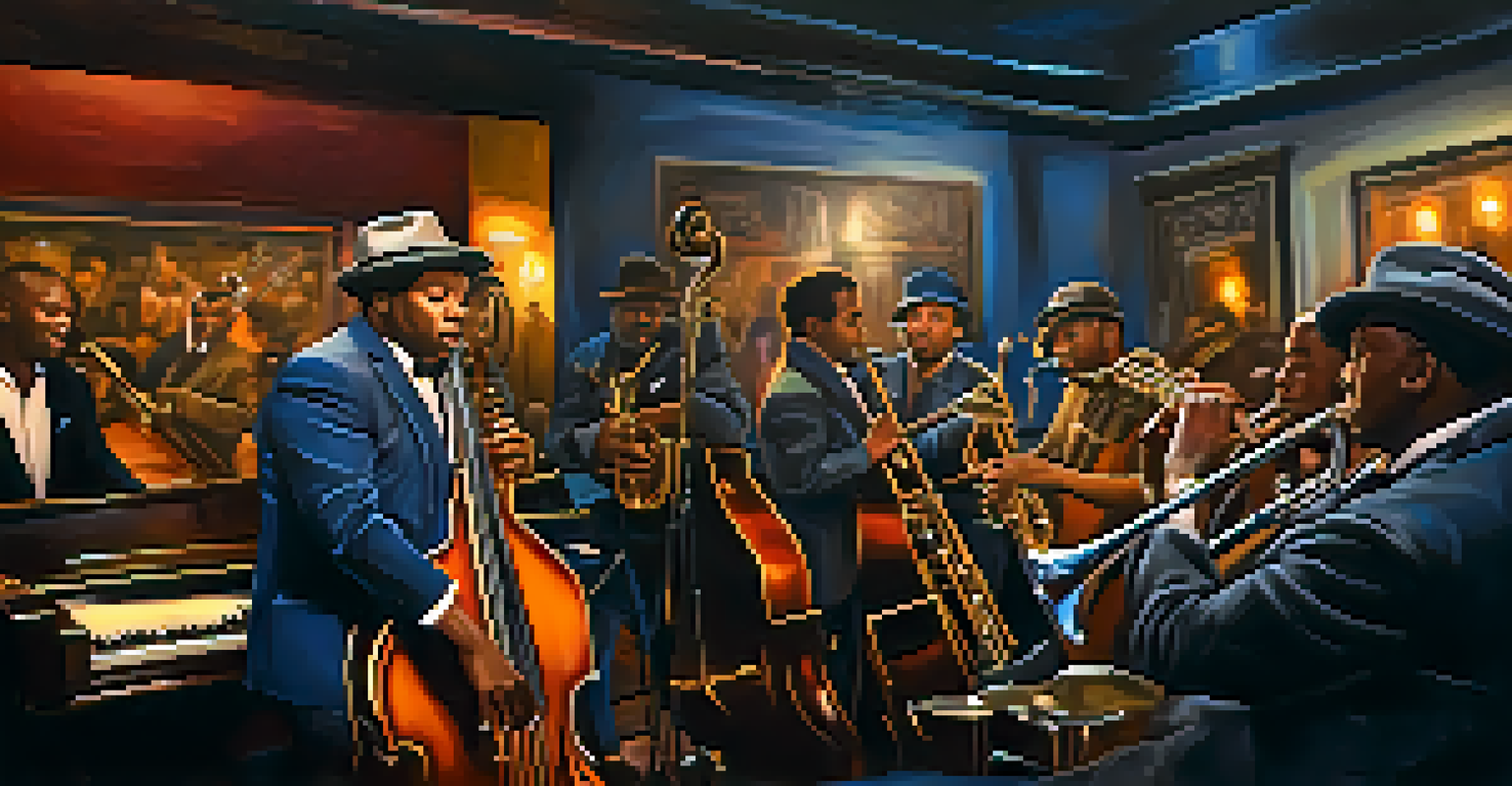How Different Genres of Music Affect Brain Activity

The Science Behind Music and the Brain
Music has a profound impact on our brains, influencing emotions, cognition, and even our physiological responses. When we listen to music, various regions of the brain light up, including areas responsible for memory and emotion. This is why a familiar tune can evoke powerful memories or feelings, almost like a time machine that transports us back to a specific moment in our lives.
Music can change the world because it can change people.
Neuroscientists have found that music activates the brain's reward system, releasing dopamine, the 'feel-good' hormone. This explains why we often feel uplifted or motivated when we listen to our favorite songs. The connection between music and brain activity is a fascinating interplay of psychology and physiology that invites us to explore further.
Different genres of music can elicit varying responses in our brains, setting the stage for how we experience and interpret music. Understanding these nuances not only deepens our appreciation for music but also opens doors to its therapeutic uses in enhancing mental health and cognitive function.
Classical Music: A Calm and Focused Mind
Classical music has long been associated with relaxation and improved concentration. Studies suggest that listening to classical compositions, particularly those with a slower tempo, can lower anxiety levels and enhance focus. This phenomenon is often referred to as the 'Mozart Effect,' where listening to Mozart's music is believed to boost brain activity and enhance performance on tasks requiring spatial-temporal reasoning.

The harmonious and structured nature of classical music provides a soothing backdrop that encourages a state of flow. Many people find that playing classical music while studying or working helps improve their productivity and creativity. The intricate melodies and rich orchestration can stimulate the brain, promoting deeper thinking and problem-solving.
Music Influences Brain Activity
Listening to music activates various brain regions, impacting emotions, cognition, and physiological responses.
In educational settings, classical music is often played to create a serene environment that fosters learning. The calming effects can help reduce distractions and improve retention, making it a popular choice for students and professionals alike.
Rock Music: Energy and Emotion Unleashed
Rock music, with its driving rhythms and powerful lyrics, is often linked to heightened emotional states. This genre can evoke feelings of excitement, rebellion, and even nostalgia, depending on the listener's personal experiences. The energetic beats and intense guitar riffs stimulate the brain's arousal centers, making it a popular choice for workouts and adrenaline-fueled activities.
Without music, life would be a mistake.
Research shows that rock music can increase adrenaline levels, which may enhance physical performance and endurance. Many athletes incorporate rock into their playlists to boost motivation and energy during training sessions. This connection highlights how music can serve as a catalyst for physical and mental empowerment.
However, the emotional intensity of rock music can also lead to feelings of anger or frustration if the listener relates to the lyrics. This duality showcases how rock music can be both energizing and cathartic, allowing individuals to process complex emotions through sound.
Jazz: Creativity and Improvisation in Action
Jazz music is renowned for its improvisational nature, which can stimulate creative thinking and problem-solving skills. The spontaneous and unpredictable elements of jazz encourage listeners to think outside the box and embrace uncertainty. This can be particularly beneficial for artists, writers, and innovators who seek inspiration from various sources.
Listening to jazz can activate the brain's prefrontal cortex, an area associated with higher-order thinking and creativity. This is why many people find that jazz helps them brainstorm ideas or overcome creative blocks. The complex rhythms and harmonies can also evoke deep emotional responses, fostering a connection between creativity and feeling.
Genre-Specific Emotional Effects
Different music genres evoke distinct emotional and cognitive responses, enhancing creativity, focus, or energy.
Moreover, the collaborative spirit of jazz can enhance social interactions, making it an excellent backdrop for gatherings and creative workshops. The dynamic interplay between musicians exemplifies teamwork, which can inspire collective creativity among listeners.
Pop Music: Uplifting and Universal Appeal
Pop music is characterized by catchy melodies and relatable lyrics, making it widely accessible and enjoyable for many. Its infectious beats and uplifting themes often promote feelings of happiness and positivity. Listening to pop can stimulate the brain's reward system, enhancing mood and potentially reducing feelings of loneliness or sadness.
The repetitive structure of pop songs makes them easy to remember, contributing to their widespread popularity. This familiarity can comfort listeners, creating a sense of belonging and connection to others who share similar tastes. In social settings, pop music is often the go-to choice for parties and celebrations, inviting everyone to join in and dance.
Moreover, the genre often addresses universal themes, such as love, heartbreak, and self-empowerment, making it relatable to a broad audience. This ability to resonate with listeners on a personal level further solidifies pop music's role in shaping our emotional landscapes.
Hip-Hop: Rhythm, Rhyme, and Resilience
Hip-hop is a powerful genre that combines rhythm, rhyme, and storytelling to convey profound messages. The lyrical content often addresses social issues, personal struggles, and triumphs, resonating with listeners on a deep level. This connection can evoke feelings of empowerment and resilience, especially among marginalized communities.
Research suggests that the rhythmic patterns of hip-hop can enhance cognitive functioning, particularly in areas like language processing and memory retention. The intricate wordplay and metaphors require active listening and critical thinking, making hip-hop a unique tool for mental engagement.
Therapeutic Uses of Music
Understanding music's effects on the brain opens doors to its therapeutic applications in mental health and well-being.
Moreover, hip-hop culture promotes creativity through its emphasis on self-expression and individuality. The genre encourages listeners to share their stories and experiences, fostering a sense of community and connection among fans.
Electronic Music: Immersion and Euphoria
Electronic music, with its pulsating beats and synthetic sounds, creates an immersive experience that can transport listeners to another realm. The repetitive structure and layered textures often induce a trance-like state, promoting relaxation and a sense of euphoria. Many fans turn to electronic music for its ability to enhance mood and foster a feeling of escapism.
Studies have shown that electronic music can stimulate the release of endorphins, the body's natural painkillers, contributing to feelings of happiness and well-being. This makes it a popular choice for festivals and dance clubs, where the atmosphere encourages movement and connection among attendees.

Additionally, the genre's versatility allows for various sub-genres, each evoking different emotions and experiences. From ambient sounds that promote calmness to high-energy beats that inspire dancing, electronic music offers something for everyone, making it a powerful force in the music landscape.